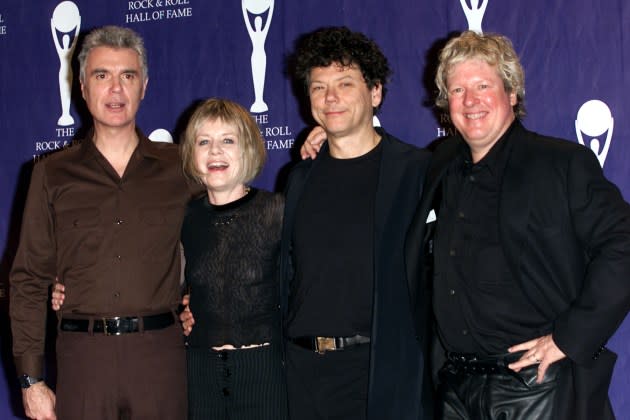Talking Heads to Appear Together for First Time in 21 Years

After 21 years of bitter estrangement, Talking Heads have agreed to come together for the first time since their induction into the Rock and Roll Hall of Fame. But don’t get overly excited. They aren’t booking a reunion tour or a headlining slot at Coachella next year. Instead, they will appear together at a 40th-anniversary screening of Stop Making Sense at the Toronto International Film Festival. Spike Lee will moderate a post-screening Q&A.
Talking Heads haven’t played a full concert together since the end of the Speaking in Tongues tour in early 1984, but they continued making records throughout the Eighties. Their only live performance took place July 17, 1989, when the Tom Tom Club — which features the Talking Heads rhythm section of drummer Chris Frantz and bassist Tina Weymouth — welcomed David Byrne and guitarist Jerry Harrison onto their stage at the Ritz in New York to play “Psycho Killer.”
More from Rolling Stone
Talking Heads Unearth 'Cities' Performance Cut From 'Stop Making Sense'
David Byrne's 'Here Lies Love' Reaches Agreement, Now Hiring Live Musicians
David Byrne's Musical Faces Opposition From Broadway Union for Not Using Live Band
The band formally broke up in 1991. Five years later, Frantz, Weymouth, and Harrison formed the Heads and cut an album with guest vocalists, including Michael Hutchence, Debbie Harry, Live’s Ed Kowalczyk, and Concrete Blonde’s Johnette Napolitano. They briefly toured with Napolitano, but Byrne filed a lawsuit to stop it. “Although [the other members of the band] may claim otherwise, it’s a pretty obvious attempt to cash in on the Talking Heads name, and yet I would define it as something new they’re doing,” Byrne told Rolling Stone in 1997. “I would say it’s not the Talking Heads, they would say it is — just without the singer … It’s different, and it should have a different name.”
They put all their differences aside in 2002 to perform a blazing set of “Psycho Killer,” “Life During Wartime,” and “Burning Down the House” at their induction into the Rock and Roll Hall of Fame. “It had been a long time since we’d had much of a conversation,” Frantz told Rolling Stone in 2009. “We’d bump into David at Lou Reed’s house or something like that. But that was the first time we’d sat down and talked.”
Over the past couple of decades, Weymouth and Frantz became increasingly vocal about their frustrations with Byrne. “[David is] incapable of returning friendship,” Weymouth said in 2004. “Cutting off attachments when a thing/person is perceived to have served its purpose, or there is a perceived threat to ego is the lifelong pattern of his relations.”
In 2020, Frantz published his memoir, Remain in Love. It centers around his long marriage to Weymouth, but it also delves deep into the band’s decades of turmoil. Rolling Stone spoke to him that year and asked about the possibility of a Talking Heads reunion. “It would be nice if it could happen because unlike many of our contemporaries, we’re all still alive,” Frantz said. “The last time I spoke with David it was regarding a reunion. First he said, ‘Let me think about it and I’ll get back to you.’ I said, ‘Fine.’ That was on a Friday night. The following Monday I got an email saying, ‘I’ve told you before and I’ll say it again for the last time. I will never reunite with the Talking Heads. Please don’t bring this up again.’ This was 2003.”
The situation wasn’t helped by Byrne’s decision to stage a Broadway show, American Utopia, where he played many of the band’s biggest hits. “I would have liked to go, but I wasn’t going to just drop in uninvited,” Frantz told Rolling Stone. “I think that would have been peculiar. And no invitation came…I think it’s highly unlikely that without Talking Heads songs, he would have even had a Broadway show.”
Harrison has maintained a closer relationship with Byrne than Weymouth and Frantz. He’s spent the past few months performing Remain in Light on a tour with guitarist Adrian Belew. “David and I have a cordial relationship,” he told Rolling Stone in 2020. “If I’m in New York, I’ll call him up and ask if he wants to get dinner…maybe we have different opinions about various things dealing with the legacy of the band or dealing with other things. But that doesn’t stop the fact that we did a lot of wonderful work together.”
The fact that Byrne is now agreeing to appear in public with his ex-bandmates will surely generate rumors of a reunion tour, and it’s easy to imagine Live Nation making them a huge money offer. They are one of the few dormant mega-bands where every member is alive and well. But the odds of it happening are still very, very low. Byrne simply has no desire to make it happen.
“I’m trying to think of any reunions I might have seen where I felt, ‘This needed to happen,’ where it allows a band to move on to the next step,” he told Rolling Stone in 2019. “With the Pixies, I thought it was terribly justified because the public caught up with what they were doing. So they finally got the audience that they deserved early on, whereas we did OK.”
Best of Rolling Stone